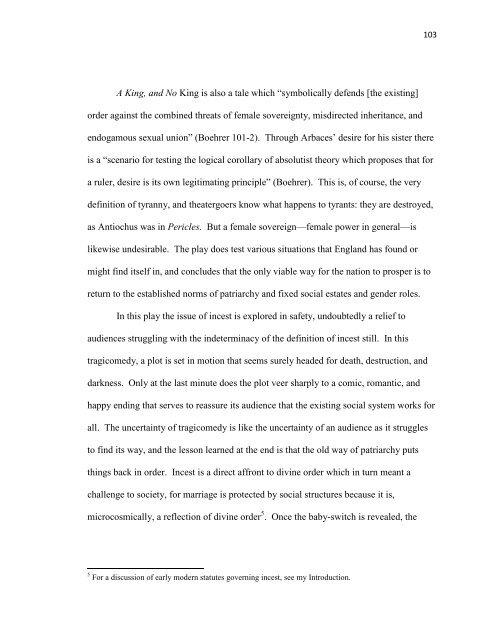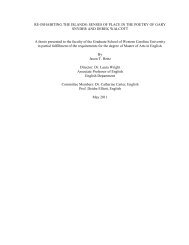SUMMERS, KAREN CRADY, Ph.D. Reading Incest - The University ...
SUMMERS, KAREN CRADY, Ph.D. Reading Incest - The University ...
SUMMERS, KAREN CRADY, Ph.D. Reading Incest - The University ...
You also want an ePaper? Increase the reach of your titles
YUMPU automatically turns print PDFs into web optimized ePapers that Google loves.
103<br />
A King, and No King is also a tale which “symbolically defends [the existing]<br />
order against the combined threats of female sovereignty, misdirected inheritance, and<br />
endogamous sexual union” (Boehrer 101-2). Through Arbaces’ desire for his sister there<br />
is a “scenario for testing the logical corollary of absolutist theory which proposes that for<br />
a ruler, desire is its own legitimating principle” (Boehrer). This is, of course, the very<br />
definition of tyranny, and theatergoers know what happens to tyrants: they are destroyed,<br />
as Antiochus was in Pericles. But a female sovereign—female power in general—is<br />
likewise undesirable. <strong>The</strong> play does test various situations that England has found or<br />
might find itself in, and concludes that the only viable way for the nation to prosper is to<br />
return to the established norms of patriarchy and fixed social estates and gender roles.<br />
In this play the issue of incest is explored in safety, undoubtedly a relief to<br />
audiences struggling with the indeterminacy of the definition of incest still. In this<br />
tragicomedy, a plot is set in motion that seems surely headed for death, destruction, and<br />
darkness. Only at the last minute does the plot veer sharply to a comic, romantic, and<br />
happy ending that serves to reassure its audience that the existing social system works for<br />
all. <strong>The</strong> uncertainty of tragicomedy is like the uncertainty of an audience as it struggles<br />
to find its way, and the lesson learned at the end is that the old way of patriarchy puts<br />
things back in order. <strong>Incest</strong> is a direct affront to divine order which in turn meant a<br />
challenge to society, for marriage is protected by social structures because it is,<br />
microcosmically, a reflection of divine order 5 . Once the baby-switch is revealed, the<br />
5 For a discussion of early modern statutes governing incest, see my Introduction.
















